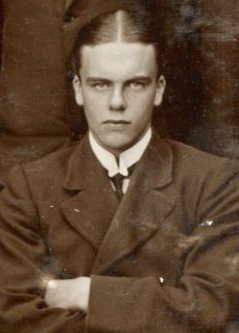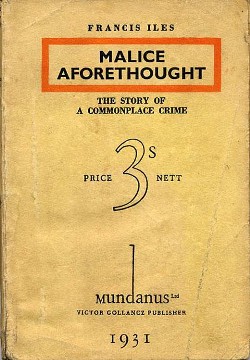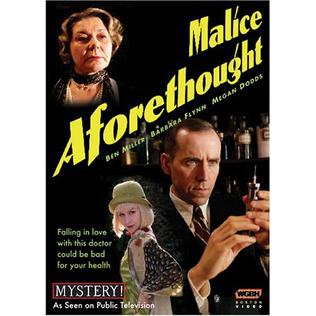Malice Aforethought is a crime novel by Francis Iles.
Malice Aforethought can also refer to:
- Malice Aforethought (TV series), BBC adaptation of the novel
- Malice Aforethought (film), Granada adaptation of the novel
Malice Aforethought is a crime novel by Francis Iles.
Malice Aforethought can also refer to:
Malice may refer to:

Anthony Berkeley Cox was an English crime writer. He wrote under several pen-names, including Francis Iles, Anthony Berkeley and A. Monmouth Platts.

Hywel Thomas Bennett was a Welsh film and television actor. He had a lead role in The Family Way (1966) and played the titular "thinking man's layabout" James Shelley in the television sitcom Shelley (1979–1992).

Erik Jendresen is an American author, playwright, screenwriter and producer of plays, television, and film. Previous projects include the HBO miniseries Band of Brothers, executive produced by Steven Spielberg and Tom Hanks, Killing Lincoln, co-produced with Tony and Ridley Scott for the National Geographic Channel; a series based on the Francis Ford Coppola film, The Conversation ; The Pony Express ; an eight-hour adaptation of Gregory Maguire's novel, Wicked (ABC); an eight-hour miniseries Majestic-12; and The Command - a series set in the world of the Joint Special Operations Command (FIC).

Malice Aforethought (1931) is a crime novel written by Anthony Berkeley Cox, using the pen name Francis Iles. It is an early and prominent example of the "inverted detective story", claimed to have been invented by R. Austin Freeman some years earlier. The murderer's identity is revealed in the first line of the novel, which gives the reader insight into the workings of his mind as his plans progress. It also contains elements of black comedy, and of serious treatment of underlying tensions in a superficially respectable community. It is loosely based on the real-life case of Herbert Armstrong, with elements of Doctor Crippen.
Malice is a legal term which refers to a party's intention to do injury to another party. Malice is either expressed or implied. For example, malice is expressed when there is manifested a deliberate intention to unlawfully take away the life of a human being. Malice is implied when no considerable provocation appears, or when the circumstances attending the killing show an abandoned and malignant heart. Malice, in a legal sense, may be inferred from the evidence and imputed to the defendant, depending on the nature of the case.
Malice aforethought is the "premeditation" or "predetermination" required as an element of some crimes in some jurisdictions and a unique element for first-degree or aggravated murder in a few. Insofar as the term is still in use, it has a technical meaning that has changed substantially over time.
Voluntary manslaughter is the killing of a human being in which the offender acted during the heat of passion, under circumstances that would cause a reasonable person to become emotionally or mentally disturbed to the point that they cannot reasonably control their emotions. Voluntary manslaughter is one of two main types of manslaughter, the other being involuntary manslaughter.
Joseph Beattie is an English actor, known for portraying Malachi in the second season of Hex (2004) and Henry Crawford in Mansfield Park (2007).
Cut-throat, cutthroat or cut throat or their plurals may refer to:

Malice Aforethought is a 2005 ITV drama based on Anthony Berkeley Cox’s 1931 novel of the same name, made by Granada Television. There was an earlier BBC television adaptation of this novel in 1979.

Max Décharné is an English rock musician and singer, and the author of nine books, mostly non-fiction, and numerous short stories.

Paul Byrne, who used the pseudonym Frank Key, was a British writer, illustrator, blogger and broadcaster best known for his self-published short-story collections and his long-running radio series Hooting Yard on the Air, which was broadcast weekly on Resonance FM from April 2004 until 2019. Key co-founded the Malice Aforethought Press with Max Décharné and published the fiction of Ellis Sharp. According to one critic, "Frank Key can probably lay claim to having written more nonsense than any other man living."
The Beacon, is a novel by English author Susan Hill, first published in 2008 by Chatto and Windus and in paperback the following year by Vintage Books.
Murder in the First may refer to:

Hannah v. Commonwealth, 153 Va. 863, 149 S.E. 419 (1929) is a Supreme Court of Virginia case that is often cited for distinguishing the "heat of passion" from malice as the motive in a crime. The formulation is:
'Malice aforethought' implies a mind under the sway of reason, whereas 'passion' whilst is does not imply a dethronement of reason, yet it is the furor brevis, which renders a man deaf to the voice of reason so that, although the act was intentional to death, it was not the result of malignity of heart, but imputable to human infirmity. Passion and malice are, therefore, inconsistent motive powers, and hence an act which proceeds from the one, cannot also proceed from the other.
A fact pattern or fact situation is a summary of the key facts of a particular legal case, presented without any associated discussion of their legal consequences.
Malice Aforethought is a 1979 BBC TV adaptation of the novel of the same name. It is a four-part serial It later aired in 1981 when it was featured in the US PBS series, Mystery!, introduced by Vincent Price. It was praised as a faithful adaptation, which retained the atmosphere and 1920s setting of the book. Cheryl Campbell was nominated for a BAFTA Award for Best Actress for her role as Madeleine Cranmere, along with her performance in Testament of Youth, winning for the latter at the 1980 Baftas.

My Dearest Self with Malice Aforethought is a Japanese manga series written by Hajime Inoryu and illustrated by Shota Ito. It was serialized in Kodansha's Weekly Young Magazine from May 2018 to August 2019, when it moved to the Comic Days manga website, where the series finished its serialization in September 2020. The series' individual chapters were collected into eleven volumes. A television drama adaptation aired on Fuji TV from October to November 2022.
John Wilson Vickers was a criminal from the United Kingdom who became the first person to be executed under the terms of the Homicide Act 1957. He had been convicted of the fatal bludgeoning of an elderly woman named Jane Duckett during a robbery in Carlisle. Vickers' appeal on the grounds that he had not intended to kill Duckett has become a leading case on the degree of malice needed to prove murder in English law.